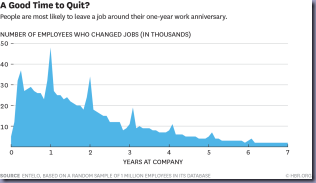July 13, 2015
Does Job Jumping Matter Anymore?
I would answer no. I have the opportunity to look at many resumes on any given day and there is a definite sea-change in the job jumping area. Millennials are far less loyal to their employers than any generation before them. In fact, I would say “job” jumping isn’t accurate, they are actually “skill” jumping. These employees are often looking for personal skill development and once they sense they have tapped out their growth curve in their current role, they leave.
I spend a fair amount of time explaining this skill jumping behavior to old-school hiring managers. Companies must have a plan for ongoing development of their Millennial workforce otherwise they will look for skill development at a different company.
This somewhat new trend is well documented in this Harvard Business Review article. From the article:
Sullivan says that employers have become more accepting of brief periods of employment. As many as 32% of employers expect job-jumping. “It’s become part of life,” says Sullivan. In fact, people are most likely to leave their jobs after their first, second, or third work anniversaries. Millennials are especially prone to short stays at jobs. Sullivan’s research shows that 70% quit their jobs within two years. So the advice to stick it out at a job for the sake of your resume is just no longer valid.
Did you catch that…2 years! I suspect that fact is due to companies being slow to provide development paths for these new employees. The days of pension-earning careers with one company are long gone.
The Millennials are skewing the tenure number lower, but other generations are catching on also:
The average length of time a worker stays in a job these days is 4.6 years.
Have a plan to grow your direct reports’ individual skill sets. Put milestones out there for them to achieve. Have a plan and share it with them. If you need help, we can help.
Comments Off on Does Job Jumping Matter Anymore?


 Comments(1)
Comments(1)





